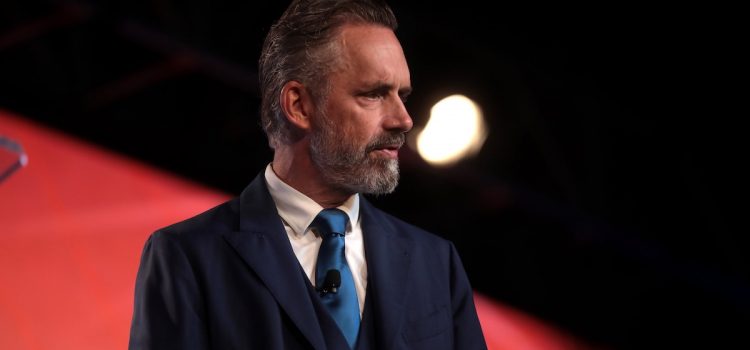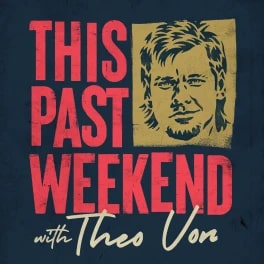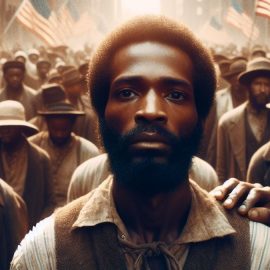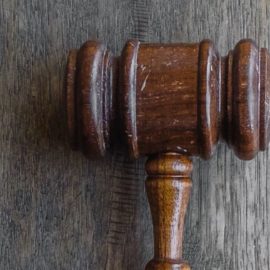

This article is an excerpt from the Shortform guide to "This Past Weekend". Shortform has the world's best summaries and analyses of books, podcasts, and more.
Like this article? Sign up for a free trial here.
Do you really have freedom of speech? Do you feel like you can fully express your views privately or online? What has Jordan Peterson’s experience been?
According to Jordan Peterson, free speech is at great risk. Peterson and podcast host Theo Von engaged in a stimulating conversation on This Past Weekend. They talked about compelled speech legislation in Canada, speech on the internet, and AI deepfakes.
Read more for a summary of this conversation, along with some context and recommendations for related reading.
Image source: Gage Skidmore
Jordan Peterson on Free Speech
The podcast episode included an invigorating exploration of Jordan Peterson’s free speech experiences and perspectives. He expressed concern about his ongoing legal issues, which he believes stem from his public criticisms of Canadian Prime Minister Justin Trudeau. With the threat of court-mandated social media retraining being held over his head, his worries about free speech restrictions only amplify.
Peterson also discussed a perceived shift within Canadian institutions, citing changes in media agencies such as the Canadian Broadcasting Corporation (CBC) and a leftward drift within Trudeau’s Liberal Party.
Digital Threats to Free Speech
Peterson pivoted to the complex issue of free speech in the digital age. Drawing on his own experiences with legal challenges stemming from his critiques, Peterson highlighted the societal and digital threats to open discourse. He expressed concern about the negative impact of online trolls and manipulation. While acknowledging the democratizing potential of digital platforms, he also raised concerns about the tendency for these platforms to amplify hostility, creating a stark contrast to the norms of face-to-face interactions.
In addition to this, Peterson outlined the illicit use of the internet by fraudsters who prey on vulnerable groups such as the elderly. He suggested a solution that included segregating anonymous users from identifiable ones, while acknowledging the complex nature of digital ID verification.
Peterson delved into the thorny issue of online misinformation, singling out Twitter’s vulnerability to manipulation. He shared techniques for navigating biased AI tools, hinting at potential ideological biases within these platforms.
Podcast host Theo Von raised concerns about the anonymity-fueled exploitation rampant on social media, questioning the effectiveness of potential restrictive measures on these platforms.
Further adding to the complexity, Peterson identified a group he calls the “dark tetrad”— individuals displaying Machiavellianism, narcissism, psychopathy, and sadism—whom he sees as major contributors to the toxic online environment.
More Perspectives
Claims about legal issues and political shifts need careful examination. We must consider the specific context and potential violations before drawing conclusions. Likewise, while digital platforms can foster negativity, they also enable constructive discourse and marginalized voices. We shouldn’t overlook their potential for connection and inclusivity.
Misinformation is a complex issue across various online spaces, not just specific platforms. Addressing it requires collaboration, not scapegoating. Similarly, disruptive online behavior has multiple causes, not just individual traits. We need systemic solutions rather than individual blame.
Deep-fake technologies have risks, but they also have potential benefits in creative fields and historical preservation. We should look for ways to mitigate risks with ethical guidelines and regulations while being careful not to stifle innovation.
Related Reading
Ontario court rules against Jordan Peterson
An Ontario court has ruled against psychologist and media personality Jordan Peterson, upholding a regulatory body’s order for him to undergo social media training.
When is an online threat illegal and when is it free speech?
The Supreme Court is set to hear a case that examines the boundaries between free speech and online threats. Anthony Elonis was convicted of violating a federal law for posting violent rap lyrics on Facebook about killing his wife and attacking others.
Social media’s growing impact on our lives
Social media use has significantly increased over the past decade, with around 70 percent of adults in the United States now using social media platforms. Research is being conducted to understand the impact of social media on our lives and psychological well-being.
Deepfakes – The Good, the Bad, and the Ugly – Forbes
Deepfake technology, which uses AI-generated imitations, is considered a major challenge by cyber security experts. Deepfakes have been used to create pornographic images and manipulate political speeches, raising concerns about privacy and misuse. While deepfake technology has potential value, it also poses risks and challenges for fraud investigators.

———End of Preview———
Like what you just read? Read the rest of the world's best guides to This Past Weekend" at Shortform.
Here's what you'll find in our full This Past Weekend episode summaries:
- Notable moments from interviews with celebrities and everyday people
- Unique topics like learning what it’s like to work as a mall security guard
- Entertaining and trending tidbits related pop culture and lifestyle topics






